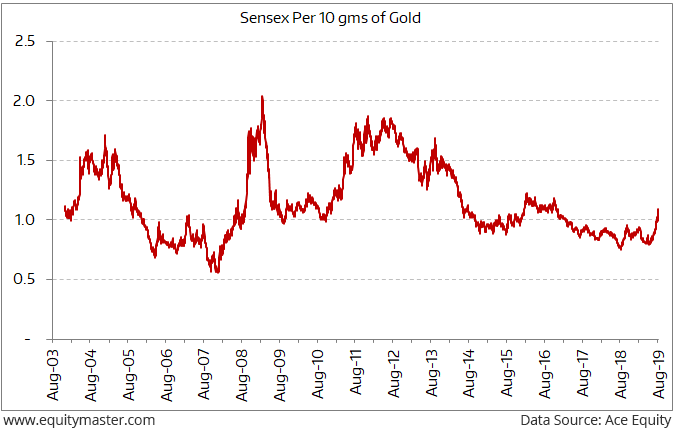Indian Indices Extend Losses; Sensex Slips Over 200 Points
Share markets in India have erased early morning gains and are presently trading lower. Investors are awaiting the April-June quarter (Q1FY20) GDP numbers to be released later in the day. Data on forex reserves, infrastructure output, and bank loan growth will also be released today.
Sectoral indices are trading on a mixed note with stocks in the power sector and capital goods sector witnessing maximum selling pressure, while metal stocks and healthcare stocks are trading in green.
The BSE Sensex is trading down by 176 points while the NSE Nifty is trading down by 58 points. The BSE Mid Cap index and the BSE Small Cap index are trading on a flat note.
The rupee is trading at 71.72 against the US$.
Speaking of the fall in Indian stock markets, Richa Agarwal reveals her investing strategy amid all gloom and doom.
She also talks about the stock she is looking at in such times. She is very cautious in her approach and looks for the stocks that survive in all the market cycles.
Tune in to find out more...
In news from the banking sector, HDFC Bank is planning to sell its entire stake in software company Goods & Services Tax Network.
Reports state that the private lender has agreed to sell its entire stake of 10% in the equity share capital of Goods & Services Tax Network (GSTN) consisting of 10,00,000 equity shares of Rs 10 each, for a total consideration of Rs 10 million to various state governments and union territories.
HDFC Bank share price is presently trading up by 0.7%.
Meanwhile, shares of Yes Bank slipped up to 3% ahead of its board meeting scheduled later today. The lender is likely to consider raising funds worth US$ 1.2 billion.
In a filing to exchanges earlier this week, Yes Bank said, "the board will be considering raising of funds by way of issuance of equity shares when it meets on August 30".
Earlier this month, the bank had raised Rs 19.3 billion through the Qualified Institution Placement (QIP) route. It had allotted 231 million equity shares to eligible qualified institutional buyers (QIBs) at Rs 83.55 per equity share.
According to Moody's Investors Service, the QIP will moderately improve Yes Bank's reported common equity tier 1 (CET1) ratio to 8.6% from 8%.
On August 28, the global rating agency had downgraded its long-term foreign currency issuer rating, citing the bank's capital raise that fell short of its expectations.
Yes Bank share price is presently trading down by 1%.
Moving on to news from the commodity space, gold prices inched lower today as the United States and China indicated they may resume talks to resolve their protracted trade conflict, putting the metal on track for a small weekly loss despite a strong month.
China's commerce ministry said on Thursday Beijing and Washington were discussing the next round of face-to-face talks scheduled for September, but added it was important for Washington to cancel a tariff increase.
US President Donald Trump also said some discussions were taking place on Thursday, ahead of a looming deadline for additional US tariffs on September 1.
Note that gold prices jumped Rs 250 on Thursday, to breach the record Rs 40,000 per 10-gram level for the first time at the bullion market on strong demand from investors amid growing fears of global economic slowdown.
Gold spurted by Rs 250 to a fresh life-time high of Rs 40,220 per gram, maintaining its record-breaking run for the second day. The precious metal had gained Rs 300 to close at Rs 39,970 per 10 grams on Wednesday.
Traders said that worries over a possible global recession and uncertainty over the US-China trade talks boosted the demand for gold.
Speaking of Gold, co-head of research, Tanushree Banerjee shares some interesting information on the Sensex to Gold (per 10 grams) ratio going back 15 years.
Have a look at the chart below:
Sensex versus Gold in Fairly Valued Zone

Here's what she wrote in a recent edition of The 5 Minute WrapUp...
- While the ratio has been quite volatile, the average ratio turns out to be 1.
In other words, whenever the Sensex has risen at a much faster pace than gold prices, its fall has also been equally precipitous. The reason behind this volatility is not hard to find.
Stock markets are more amenable to manipulation than gold prices are.
Thus, if the Sensex to gold price ratio is way more than one, it could be a signal the Sensex is overvalued.
Alternatively, if it is way below one, it could mean that Sensex is undervalued.
The ratio stands at around 1.09 currently, indicating that the Sensex is trading pretty close to its fair value!
Thus, even though the market correction seems overdone in mid and smallcaps, the bluechips, particularly those in the Sensex, aren't undervalued yet.
To know what's moving the Indian stock markets today, check out the most recent



